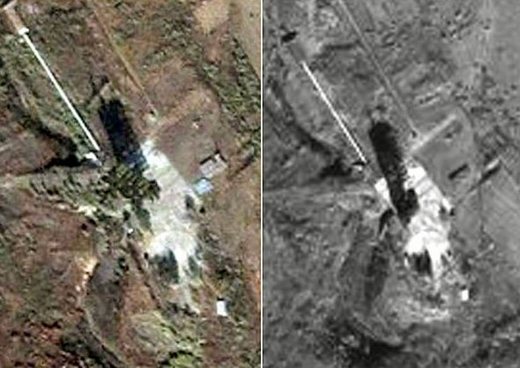 |
|
The missile launch pad in Musudanri in North Hamgyong Province. Left picture is taken in November, 2000, and right in November 1999. Seoul/Yonhap.
|
Seoul thinks that Pyongyang may have brought about the second missile crisis because it learned lessons from Iran. A South Korean official in charge of monitoring the North Korean missile program said of Iran on June 18, "The U.S., which had maintained a hard-line stance, changed its attitude and indicated that if Iran stops enriching uranium, it will negotiate with the Islamic republic." "The North may have concluded that Iran’s successful test-firing of a medium-range ballistic Shahab 3 missile decisively influenced the U.S. to change its attitude," the official added. "Iran’s missiles are equipped with the ability to carry a payload of nuclear weapons. Moreover, they have a range of 1,300-2,000 km, so they could be used to attack Israel," the official continued. According to the official, Pyongyang could have made the conclusion that while the U.S. has as of late declined bilateral dialogue with the North, if the communist regime fires a missile which can reach the U.S. mainland, Washington will have to accept two-way negotiations. The official noted that the South Korean government witnessed the North’s suspicious movements in mid-May and repeatedly demanded the U.S. to "take measures." Washington, however, rejected Seoul’s demand, saying, "We don’t want to be deceived by North Korea," the official said. The official, however, thinks that the U.S. won’t react in accordance with the North’s calculation. "The possibility is high that instead, Washington will put pressure on Seoul to join in sanctions or some other punishment against Pyongyang or attempt to step up the missile defense (MD) system in Northeast Asia after declaring Seoul’s policy of dialogue a failure." In that case, the official predicted, with conflicting interests in the North and U.S., Seoul would be stuck between a rock and a hard place, "in trouble." If the North does fire the missile, the Roh Moo-hyun administration in specific will be in serious trouble: faced with the U.S. pressure to join punitive measures against the North and a backlash from conservatives in and out of the country, it will have to make difficult choices. In retrospect, the North’s unilateral cancellation of a cross-border railways test-run on May 25 could be seen as the North temporarily putting the brakes on the development speed of inter-Korean relations in consideration of a planned missile test-fire. Or, as the South is already set to provide the North 80 million USD worth of materials for its impoverished light industries, and the agreement calls for the materials to be delivered in August, more than a month away, North Korea may have judged that the missile test would not impose significant direct damage to government-level inter-Korean relations overall. As for the six-party talks on the North Korean nuclear weapons program, stalled since November last year, paradoxically both Pyongyang and Washington stress the importance of the dialogue. Regarding the North’s moves to execute a missile launch, U.S. State Department spokesman Sean McCormack claimed that it would be a violation of the contents and spirit of the September 19 Joint Statement signed by all six-party nations at the close of the fourth round in Beijing. At the same time, the North has used the "spirit" of the joint statement to decry U.S. policy hostile toward the regime. Analysts predict that South Korea, China, and Russia are likely to want the missile problem solved within the frame of the six-party talks, instead of alternate measures, such as forming a joint regional coalition against North Korea. The U.S. and China will hold different views regarding the missile test, but the two nations are not expected to confront each other seriously, as the U.S. needs China’s cooperation to refer North Korea to the U.N. Security Council and to seek an economic blockade against it. The position of China as a mediator is set to strengthen. On the contrary, Japan, like the U.S., is expected to seek substantial sanctions and spearhead hard-line measures against the North. In this context, with the U.S. and Japan on one side and South Korea and China on the other, the gap between the two lines of thought may become even wider with the impending missile crisis. In this respect, it is indeed a very dangerous card for Pyongyang to play.





